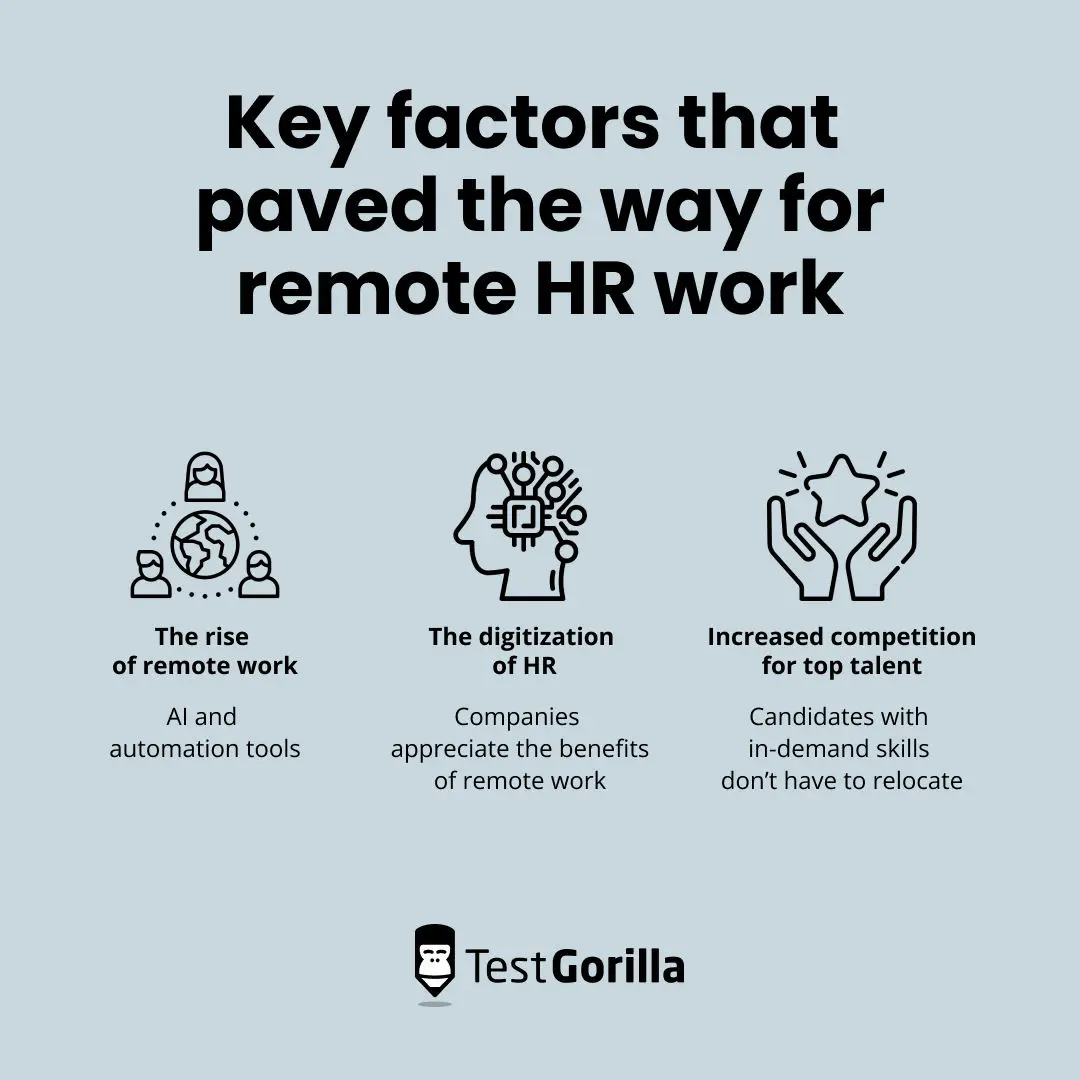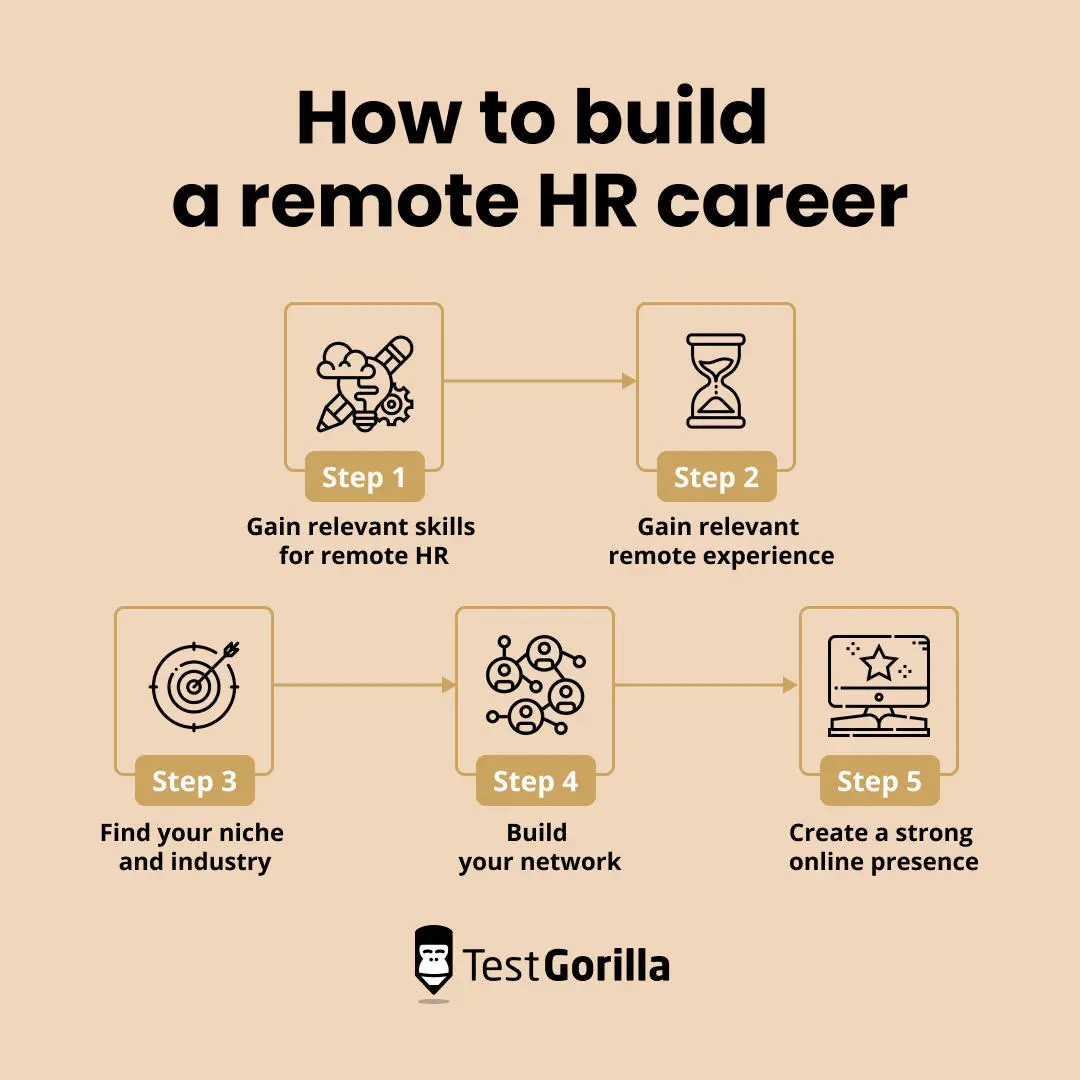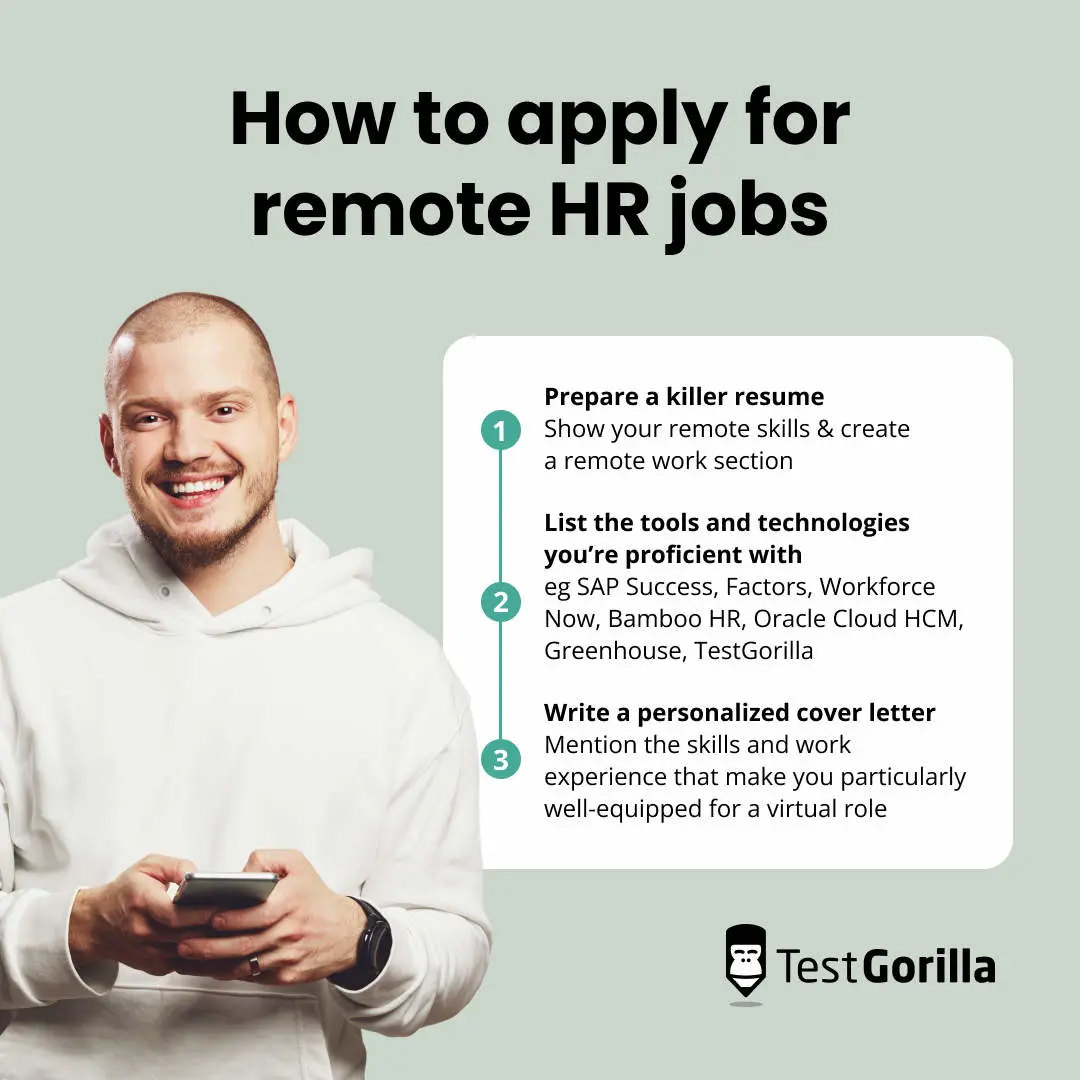Remote work is the new normal for many companies and employees, and more than a few aren’t planning to go back to a traditional office environment.
However, if you work in human resources, you may be wondering whether you can still work as a remote employee and enjoy the flexibility of working from home without changing fields.
Are there any remote HR jobs out there? Can you leverage your skills in remote recruitment to actually find a remote HR position for yourself? And which are the companies that hire remotely for HR roles?
We’ve set out on a mission to find answers to all those questions – and more. Below, you’ll find all you need to know about working in HR from home.
Table of contents
Can you work in HR remotely?
Can you work in HR remotely, though? Isn’t HR a hands-on field where you need to be in the office all the time?
The answer is, yes, you can work in HR remotely, and many HR professionals already do – and will continue to do so. The pandemic played a role in all that, of course. But that’s not all.
There are three key factors that paved the way for remote HR work:
The digitization of HR: HR is rapidly becoming more digital and we expect that transformation to continue. With the growing importance of AI in HR, many HR teams are automating some parts of recruitment. Although HR professionals aren’t likely to be replaced by algorithms anytime soon, new tools that have revolutionized the field – and make remote HR possible. These include ATS, video conferencing software, and online skills tests.
The rise of remote work: It’s now obvious that most office jobs can be done remotely – and that employees don’t need constant surveillance to be efficient. Many workers now demand more flexibility (and trust). Additionally, many companies now hire remotely and appreciate the benefits remote work offers them (e.g., less overhead and a larger talent pool).
Increased competition for top talent: Candidates with in-demand skills may not be willing to relocate for a job, and with the increased availability of remote HR jobs, they don’t have to. So employers who want to be in the mix to hire the best HR professionals on the job market have to adapt and give them the flexibility they demand.
Can all HR professionals work from home?
You’re probably wondering whether working from home is possible for all HR roles and in all industries.
In short, yes, all HR professionals could work from home, from entry level positions, such as HR administrators or HR assistants, to senior roles, like HR managers, HR directors and CHROs.
That being said, some tasks require a more hands-on approach, which means that you might have to go to the office from time to time. Examples include:
On-site training
Handling confidential documents that shouldn't leave the office
Managing confidential discussions
Managing employee conflicts
Overseeing compliance and safety inspections
That’s true only for traditional companies that do have a physical office, though. If you work with fully remote teams, you won’t need to do any of that – which might also impact your choice of an employer.
How to build a remote HR career
If you’re just starting your career, you’re probably wondering how to make it future-proof from the start – and how to zero in on the competencies and skills that will enable you to work in HR from home.
We’ve created a step-by-step roadmap to help you with this.
Step 1: Gain relevant skills for remote HR
Presumably, you already have a background and a degree in HR, business administration, psychology, or a related field.
Now, you need to make sure you have all the skills and knowledge that are necessary for remote HR work, such as:
A solid understanding of remote hiring processes and AI and machine learning in HR
Proficiency in HR information systems (HRIS), applicant tracking systems (ATS), video conferencing tools, skills assessment tools, employee engagement platforms, and more
Excellent organizational and time management skills
Strong digital literacy
Step 2: Gain relevant remote experience
In the next section, we’ll explain how to seek opportunities that allow you to work remotely in HR. If you don’t find fully remote positions at first, you can try out flexible roles to build your remote HR skills progressively.
Tailor your resume to highlight skills and experiences that are relevant to remote HR roles, such as digital proficiency, experience with specific HR tools that facilitate remote hiring and HR management, and strong communication skills.
Step 3: Find your niche and industry
HR has many niches like recruiting, learning and development, employee relations, compensation and benefits, and more. By now, you should already have an idea of the types of projects you enjoy the most – and that are the most flexible in terms of working remotely – so consider specializing in a particular field.
Some industries are more remote-friendly than others, too. For example, tech startups are more likely to seek out remote HR professionals than retail brands.
In parallel to that, you need to stay updated with the latest HR trends, labor laws, and remote work best practices.
Step 4: Build your network
Networking is important for any HR role and specialty, but in remote HR it becomes crucial, especially if you decide to work as a freelancer or launch your own agency.
For this, you can:
Join HR networks and groups on social media
Build a strong presence on LinkedIn
Attend webinars and even organize your own
Go to conferences and summits where you can meet with other professionals
Conferences that you can visit to build your network include:
The SHRM Annual Conference, one of the largest HR conferences worldwide
UNLEASH World, focused on the future of work and HR technology
HR Technology Conference and Exposition, for tech and HR professionals
You can also seek mentors in the HR field who have experience in remote HR work environments.
Step 5: Create a strong online presence
A career in remote HR requires a polished online presence. For this, we advise you to:
Keep your LinkedIn profile up-to-date and publish new posts regularly
Create a portfolio to show your work on remote HR projects along with relevant certifications
Consider building a website to present your work and add testimonials from happy clients or previous employers
Write articles, participate in webinars, or speak at events to establish yourself as a knowledgeable professional in remote HR
Where can you find remote HR jobs?
There are plenty of job boards who offer remote HR positions, from standard job boards like Indeed.com to specialized HR platforms, such as SHRM.
First, decide whether you want to work as an employee or as a freelancer, and also whether you want to limit your search to a specific country or not. In general, it’s easier to be hired as an employee in the country where you’re a resident, because legal aspects are easier to navigate for the hiring organization.
If you want to extend your job search globally, in some instances you might need to declare yourself self-employed and handle your own taxes when working in HR from home.
If you opt to work as a contractor, you could have a few clients at the same time. This enables you to test out:
Different working environments
Different industries or types of organizations
Specific responsibilities
Entry- and mid-level remote HR jobs
Remote HR has a lower barrier of entry for entry-level roles, such as:
HR associate
HR generalist
HR representative
HR partner
You can simply use standard job boards by selecting “Remote” as the location.
Mid-level remote HR jobs are more competitive, but they’re also listed on all of the popular job boards. In this category, roles include:
HR specialist
HR analyst
HR supervisor
Personnel manager
Hiring manager
Here are a few more places to find entry- and mid-level remote HR jobs:
LinkedIn: On LinkedIn, you can find anything, from lower-level to senior remote HR roles. However, other candidates are also using LinkedIn extensively, so competition for every role is higher.
Remote.co: This is a job board that specializes in remote work, where you can find HR work-from-home opportunities, too. Entry-level positions are plentiful.
FlexJobs: FlexJobs is another website by the creators of Remote.co and it’s currently one of the biggest job boards for remote work. Many companies who post ads on FlexJobs are looking for US-based professionals, so keep that in mind when scanning the offers for remote HR work.
Indeed: This is one of the largest job boards with many local websites in different countries, so you can search for remote or flexible HR jobs in your area.
Remotive.io: This job board has a good selection of hand-screened remote HR jobs, with new jobs every day. There, you can find mostly lower and entry-level remote HR work, but there are mid-level and senior HR jobs from time to time.
Glassdoor: Although Glassdoor’s primary function is to give employees visibility into companies’ working conditions and environment, it also features a job ad board where you can find remote HR work. Plus, you can quickly check the company that interests you and see what its employees have to say about it.
WeWorkRemotely: WeWorkRemotely is another popular job board for remote work – and the good news is that it doesn’t scrape listings from other job boards. Instead, companies post job offers directly on the website. WWR is geared towards tech positions, but you can still find job offers for remote HR roles.
If you’d like to work as a remote HR contractor, search the same job boards, in particular LinkedIn, FlexJobs, Remote.co and WeWorkRemotely. On LinkedIn, for example, you can filter your search to see which companies are looking for contractors, but you can also simply mention it in your cover letter when applying.
Alternatively, use freelancing websites like:
Upwork: List your skills and submit proposals for jobs that interest you. You may also be invited to submit proposals for remote HR projects.
Guru: Guru is another freelancing job board like Upwork. Like Upwork, you build a profile and submit proposals to win projects.
PeoplePerHour: PPH is somewhat more selective when it comes to accepting employers, so you have a better chance of finding good clients that offer stable (and better paid) remote HR work.
Specialized and senior-level remoteHR jobs
Senior-level and specialized remote HR positions can be more difficult to find, but that’s simply because there are fewer of them. But remote senior-level HR positions are becoming increasingly common, according to SHRM.
Specialized job boards are your best bet for finding senior-level and specialized HR jobs that allow work from home. Such positions include:
HR manager or director
Chief human resources officer (CHRO)
Vice president of HR
Benefits administrator
Staffing manager
Safety manager
Development manager
However, it’s also worth taking a look at traditional job boards.
Specialized HR job boards include:
SHRM’s job board: This is one of the places where you could find senior positions. Although many of them aren’t remote, you can click on the “Location” tab in the results area to see remote jobs.
HRJobs: HRJobs is another HR-oriented job board for professionals and companies who are looking to hire. Again, the website is not specifically oriented towards people looking to work remotely, but you can search for remote HR positions.
Among the traditional job boards where you have a higher chance of finding a senior or a specialized remote position, you could keep an eye on:
LinkedIn: Senior-level HR jobs that allow for work from home get listed on LinkedIn frequently, so keep an eye for them. You can filter by seniority level to zero in on relevant openings.
FlexJobs: Given that FlexJobs is one of the biggest job boards for remote work, your odds of finding a position that suits you are higher here than on other sites (although most of them will be US-based).
Indeed: Indeed is one of the largest job boards with many local websites in different countries, and you can definitely find senior or specialized remote HR positions on it.
Glassdoor: On Glassdoor, you can often find remote HR jobs for senior professionals.
How to apply for remote HR jobs
You’re probably pretty familiar with the application process, but let’s go through it and see what you can do to stand out when seeking flexible and remote HR jobs.
1. Prepare a killer resume
It’s not easy to write your resume, even if you’ve seen thousands in your career. So, how can you build a rockstar-caliber resume that knocks everyone’s socks off?
We’ve covered the basics of writing a great HR resume in detail in our article on HR resumes, but here are two tips specific to getting a remote HR job:
Show your remote skills: Call out any achievements that demonstrate your remote work skills. Employers will want to see that you are independent, collaborative, self-motivated, organized, good at managing your time, and have strong writing skills.
Create a remote work section: In addition to highlighting your remote work skills, you may want to create a separate section for your remote work experience.
2. List the tools and technologies you’re proficient with
Remote work is all about having the right organizational skills and mindset, but being a proficient user of software applications and tools that facilitate remote work will make your resume stand out – tools like:
SAP SuccessFactors
Workforce Now
Bamboo HR
Oracle Cloud HCM
Greenhouse
TestGorilla
You can also mention apps that facilitate remote work in general, or remote project and team management in particular. These include:
Slack
Google Drive and Google Docs
Microsoft Teams
Trello
Jira
Asana
Airtable
Basecamp
Monday.com
3. Write a personalized cover letter
That goes without saying, but many applicants are simply changing the name of the receiver (if that). But you work in HR. You wouldn’t do that!
So, as usual, adapt your cover letter to the specific position you’re applying for, by outlining the specific skills you have that match the company’s requirements.
The only difference between a cover letter for a remote HR job and one in an office is that you’ll need to mention the skills and work experience that make you particularly well-equipped for a virtual role.
What are the skills you need to apply for remote HR jobs?
And finally, let’s look at the remote work skills that’ll help you stand out if you’re looking for a virtual HR job.
Independence
To work remotely, you need to be a self-starter. You’ll often need to juggle between lots of different tasks, prioritize between them and manage your time successfully.
How to prove that: In your resume, outline previous experience where you needed to be independent and work on your own, and how you handled it. Having experience as a remote worker is a huge plus.
Excellent written communication skills
HR professionals working from home need to rely on emails, Slack, and other text-based communication channels a lot more than office workers, so written communication is a must-have skill.
How to prove that: Show it! Prepare a resume that stands out, along with a well-written cover letter, and follow up on your application.
Intercultural communication skills
Remote teams are often distributed globally (like our team at TestGorilla, for example), which means that you might be working with teammates from several countries and cultures. Therefore, you need to prove you can effortlessly communicate with people from all over the world and can manage cross-cultural recruitment processes.
How to prove that: Highlight international experiences in your resume and discuss them during the interview. Examples might include:
Internships or studies abroad
Student exchange programs
Previous work with big multicultural companies or diverse teams
Being tech-savvy and adapting to new technologies easily
Remote work relies heavily on technology, so it’s essential to be comfortable with using different software tools and acquiring new tech skills as needed.
It’s less about the specific tools you’ve used (although these are also important) but rather about the ease with which you learn to use new ones – and your willingness to learn.
How to prove that: On top of listing and discussing specific tools you’re currently using, show that you understand the principles behind the new applications for remote work.
To be well-prepared for the interview, take some time to understand the basics of:
Cloud technology
Software integrations
Different collaborative practices and processes
Adaptability
In a world where everything is changing fast, adaptability is everything, and companies know that. When working from home in HR, sometimes you’ll have to figure out workarounds and alternative solutions to problems, and these won’t always be laid out in workflows and procedures.
How to prove that: Discuss a time where you adapted to a major change or how you supported your previous company’s growth or expansion to a new location.
What are HR professionals saying about remote HR work?
For this article, we interviewed two HR professionals who shared their insights on remote work – Michael Hurwitz, president and co-founder of Careers In Government, Inc., and Laura Summer, HR specialist working remotely for Evisa Express.
Although Careers In Government doesn’t specialize in remote work in particular, according to Michael Hurwitz, remote HR is clearly a growing trend. According to him, many HR professionals, including recruiters and HR managers, have successfully transitioned to fully remote positions in the past year.
This has been facilitated by the widespread adoption of remote recruitment and virtual onboarding processes, enabling organizations to source talent from diverse geographic locations. To guarantee team cohesion in a remote-first environment, HR professionals need to look for innovative collaboration methods.
Laura Summer, who’s currently a HR specialist at Evisa Express (for their brand Vignette Express), was considering a move from Cleveland, OH to Europe, and remote work helped her achieve her goal.
First she started looking for flexible HR roles on various websites like Indeed or CareerBuilder, then moved on to browsing listings on regional, country-specific websites – before finally finding her current job via LinkedIn.
The application and interview process was fairly straightforward; she uploaded her resume and application on LinkedIn and had an interview on Google Meet; after a few days, she got a call back saying that she got the job.
For her, the biggest benefit of remote HR work is the flexibility, enabling her to adjust her hours to meet employees' availability and accommodate their needs. She also noticed that she’s more productive when working remotely, not less.
Although the jury’s still out on the effect of remote work on productivity, many workers feel the same way; according to Owl Labs’ research, 90% of remote employees say they’re as productive – or more – when working from home, compared to when they’re working at the office.
Although she really enjoys working in HR from home, she says that remote work is not for everyone; some people might feel disconnected from others and might actually need daily face-to-face interactions with their coworkers to thrive.
So, before you go fully remote, consider whether you might actually like seeing your team in person from time to time – if so, a flexible work arrangement might be a better fit. Plus, your home will be the place you spend the majority of your time, so you need to make sure you’re able to keep a good work-life balance when working in HR remotely.
Remote HR is no longer the exception – it’s a growing trend
Many companies have switched to remote work or flexible work-from-home arrangements.
This means that the demand for remote HR professionals will only grow in the next few years. On the other hand, competition will be global, too.
As a result, keeping your skills up-to-date is more important than ever, as well as marketing yourself well with your resume, LinkedIn profile, and cover letter.
One of the best ways to prove you’re serious about building a career in remote HR is to proactively learn to use new tools that facilitate remote hiring. One example is TestGorilla, our skills-tasting platform that enables companies to evaluate applicants’ skills objectively and hire from a global hiring pool.
With our free plan, that’s easy to do – you can simply try out the platform and see for yourself how you can help future employers hire remotely.
Alternatively, you can book a live demo to chat to one of our experts about skills-based hiring and its role in remote HR work.
Related posts
Hire the best candidates with TestGorilla
Create pre-employment assessments in minutes to screen candidates, save time, and hire the best talent.
Latest posts
The best advice in pre-employment testing, in your inbox.
No spam. Unsubscribe at any time.

Hire the best. No bias. No stress.
Our screening tests identify the best candidates and make your hiring decisions faster, easier, and bias-free.
Free resources
This checklist covers key features you should look for when choosing a skills testing platform
This resource will help you develop an onboarding checklist for new hires.
How to assess your candidates' attention to detail.
Learn how to get human resources certified through HRCI or SHRM.
Learn how you can improve the level of talent at your company.
Learn how CapitalT reduced hiring bias with online skills assessments.
Learn how to make the resume process more efficient and more effective.
Improve your hiring strategy with these 7 critical recruitment metrics.
Learn how Sukhi decreased time spent reviewing resumes by 83%!
Hire more efficiently with these hacks that 99% of recruiters aren't using.
Make a business case for diversity and inclusion initiatives with this data.




















